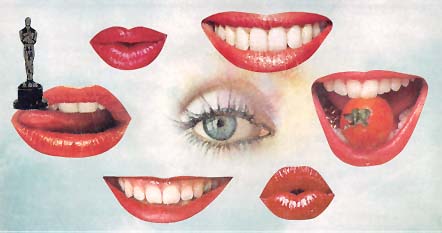So, having written that note Sunday about Ubuweb and its film archives, I finally did download & watch Frank Film by Frank & Caroline Mouris for the first time in over 30 years (and for just the third time ever). I had forgotten just how deeply and directly this film influenced my writing of Ketjak one year after I first saw it at an evening of experimental animation held at the late, lamented Surf Theater in
I had forgotten not just how directly Frank Film influenced the writing of Ketjak, I had forgotten that the film wasn’t just a one-man effort, but involved Caroline Mouris as producer & Tony Schwartz doing sound. I had forgotten – if I’d ever known – that Frank Film actually won an Oscar, for best short subject, animation, in 1973. Yes, Ketjak, that poem so disjunct that I still from people who tell me they find it too radical & alien, is in some very real sense derivative of an Academy Award-winning cartoon. If ever one needed an index of just how conservative as an institution poetry is, that’s mine. (Nor am I the only person to notice this connection of Frank Film to my work. Ubuweb’s ebook edition of 2197 uses an image that is at least based on Frank Film, if not taken directly from it, for its cover.)
And I’d forgotten, at least partly, how very simple this nine-minute film is (you can view a brief excerpt here, or download the whole from Ubuweb, which is what I recommend, tho Macs will require some special software to run it). Mouris uses two sound tracks, one of which consists of him telling his autobiography in a low-key, not quite humorous fashion (imagine a mellow version of a Robert Ashley opera sans music), the other of which consists of Mouris reading lists, sometimes of numbers, but mostly of objects related to the narrative of the autobiography. On the screen while this is going on is a peripatetic, constantly evolving collage mostly of images taken from popular magazines, really using that 24-frames-per-second possibility to show what is almost a Busby Berkeley dance of tires while one half of the sound-track discusses Mouris’ dad’s gas station, the other half lists objects one might find around an auto shop. Mouris’ imagery fits right into the collage work being done, especially on the West Coast under the rubric of funk art, at that moment in history – as distinct from the more static use of the same imagery in the hands of, say, Andy Warhol).
I know that when I first saw Frank Film at the Surf Theater in 1973, I felt that the experience, and especially the sound track, was far more disjunct than it feels to me know, watching it on a five-year-old PC monitor. Not overwhelmingly so, but close enough to make the experience completely exhilarating. For one thing, I think that we all, and perhaps me more than most, have gradually learned over the decades how to hear multiple simultaneous soundtracks in a way that we can integrate, picking & choosing which to focus on & which to treat as more ambient, than was the case when this aesthetic effect was still so new as to feel unnamable. (Another example of this same process at work: Jackson Mac Low’s earlier instances of “free writing,” such as in the Light Poems feels far less packed & disjunct than his own chance poetics at the time he composed those poems, yet because he was able to learn from younger writers like Clark Coolidge & Steve McCaffery, his acts of “free writing” later in his career handle opacity and density with terrific élan.)
So maybe Frank Film isn’t the finest single act of film since Dziga Vertov, but it’s a damn good one nonetheless. When I look it all these decades later, I can still see the ideas about multiplicity, complexity & layering that I was myself struggling with at that very moment in my own poetry active & alive here. When I saw Frank Film I wasn’t ready yet to try & put all these elements together – that would take place a year later, a few days after hearing the West Coast premier of Steve Reich’s Drumming, another work – as different from Ketjak as both are from Frank Film – investigating this same territory. Having Frank Film available, along with Vertov, and films by or about, just to drop a few names,
Vito Acconci
Robert Ashley
Bruce Baillie
John Baldessari
Samuel Beckett
Jorge Luis Borges
Stan Brakhage
James Broughton
Luis Buñuel
Jorge Luis Borges
William S. Burroughs
John Cage
Alexander Calder
Henri Chopin
Rene Clair
Jean Cocteau
Merce Cunningham
Guy Debord
Maya Deren
Marcel Duchamp
Tracy Emin
Ed Emshwiller
Flux Films
Richard Foreman
Terry Fox
Jean Genet
Alberto Giacometti
Philip Glass
Piero Heliczer
Henry Hills
Abbie Hoffman
Anish Kapoor
Raashan Roland Kirk
Jacques Lacan
George Landow
Fernand Leger
John Lennon
László Moholy-Nagy
Gordon Mumma
Bruce Nauman
Phil Niblock
Pauline Oliveros
Yoko Ono
Nam June Paik
Charlemagne Palestine
Robert Rauschenberg
Man Ray
Terry Riley
Aram Saroyan
Carolee Schneeman
Richard Serra
Jack Smith
Kiki Smith
Robert Smithson
David Wojnarowicz
Stan Vanderbeek
Agnes Varda
Edgard Varêse & Le Corbusier
William Wegman
Rachel Whiteread
David Wojnarowicz
Zubi Zuva
is frankly breathtaking. Ubuweb is one of the great cultural resources of the 21st century.






